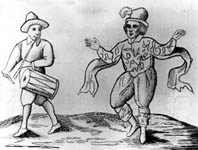Three SPECIFIC film productions
are REQUIRED viewing for the class: the film adapted from the
Video Analysis Assignment, ENGL 339
1996 Royal
Shakespeare Company stage version of A Midsummer
Night's Dream (directed by Adrian Noble)
and Laurence Olivier's classic film versions of Henry V
(1944) and Hamlet
(1948). There will be at least two scheduled group
screenings (outside of class) for each required film (details
TBA), or you can see them on your own time. Copies of each
of these required videos are on Reserve for ENGL 339 in the
Kennedy Library. For each REQUIRED
video, you must submit a video worksheet electronically to
your Polylearn Discussion Group and bring hard copy to
the class meeting devoted to video discussion. Your three
video worksheets will not receive a letter grade, but they
should be completed with care as the information they ask you to
compile is covered on the midterm and final exams. Video
worksheets factor into the Participation,
Intellectual Engagement and Collaboration component of
your final course grade: each
Video Worksheet that is NOT posted to your Discussion Group
counts as an Unexcused Absence.
--  STUDENT
PERFORMANCES: the last week of class, each student will
present a group scene or a monologue from a play
read in class. The text should be memorized and
acted with as much dramatic flair as you can muster (costumes and
props are encouraged but not required). Scenes and monologues
should be chosen carefully to illustrate key issues in the work;
the significance of the scene must be briefly explained prior to
the presentation. This REQUIRED oral exercise will be graded
pass/fail. Quality of the performance (and of the memorization)
will be recorded only as a plus or minus
used to decide borderline grades. However, failure to
present a scene or monologue will result in a
zero as half of your Participation, Intellectual
Engagement and Collaboration grade (i.e., 10% of your
final course grade = 0, making it impossible for you to
earn an A in the class). You may not present a scene
or monologue that has already been claimed by another
student. As specific speeches and scenes are claimed (first
come, first served!), I will post the list in the Announcements
section of Polylearn.
STUDENT
PERFORMANCES: the last week of class, each student will
present a group scene or a monologue from a play
read in class. The text should be memorized and
acted with as much dramatic flair as you can muster (costumes and
props are encouraged but not required). Scenes and monologues
should be chosen carefully to illustrate key issues in the work;
the significance of the scene must be briefly explained prior to
the presentation. This REQUIRED oral exercise will be graded
pass/fail. Quality of the performance (and of the memorization)
will be recorded only as a plus or minus
used to decide borderline grades. However, failure to
present a scene or monologue will result in a
zero as half of your Participation, Intellectual
Engagement and Collaboration grade (i.e., 10% of your
final course grade = 0, making it impossible for you to
earn an A in the class). You may not present a scene
or monologue that has already been claimed by another
student. As specific speeches and scenes are claimed (first
come, first served!), I will post the list in the Announcements
section of Polylearn.
For some ideas on what scene or speech to choose, follow these links
for lists of speeches/scenes performed in past quarters: W17 ENGL 339-01 Performances;
W17 ENGL 339-02 Performances;
W16 ENGL 339-01 Performances; W16 ENGL 339-02 Performances; F13 ENGL 339-01 Performances;
F13 ENGL 339-02
Performances, F13; W12
ENGL
339 Performances.
NOTE: Yes, seeing Shakespeare performed well is
fun, but remember that performances / screenings are NOT 1) a
substitute for reading the plays or 2) a free-ride that gets you
out of doing "real" work. You will be expected to ANALYZE and INTERPRET required
performances with a critical eye and to fill out and
post a Video Analysis Worksheet for each required video in
your PolyLearn Discussion
Group. To do this assignment, you will need to
note specific details from the production that
reveal the textual interpretation behind it and to
identify important textual passages upon which this
interpretation is founded. Remember that your opinions must
always be justified textually -- based not upon whim but upon your
solid knowledge of the play and informed interpretation of its
meaning. Note: A SECTION ON THE REQUIRED VIDEOS WILL BE INCLUDED
ON THE MIDTERM AND FINAL EXAMS!!

 CLASS
EMAIL
ALIAS: Important announcements concerning
this class will be sent over the class
email alias. The class email alias is
automatically generated using the email address found in the Cal
Poly Directory server for each enrolled student. If your Cal Poly
email account is NOT your preferred email address, you must
CLASS
EMAIL
ALIAS: Important announcements concerning
this class will be sent over the class
email alias. The class email alias is
automatically generated using the email address found in the Cal
Poly Directory server for each enrolled student. If your Cal Poly
email account is NOT your preferred email address, you must
- Log into http://my.calpoly.edu/
and click on "Personal Info" (the "Personal Information
Channel") to change your Email Delivery Address.
Once you have done so, any email sent to your <username@calpoly.edu>
, including all postings to the class alias, will be forwarded
to the address you have designated.
Remember: you are responsible for any information sent over
the class email alias (e.g. changes in assignments;
other class-related announcements), so be sure to check your email
regularly.
 .
.
 Participation, Intellectual
Engagement, and Collaboration
together count for 20% of your final course grade.
Participation, Intellectual
Engagement, and Collaboration
together count for 20% of your final course grade.
YOUR active participation is essential to the
success of ENGL 339! For these reasons . . .
Participation 1:
Attendance Policy. Due to the twice-weekly
class meetings, any absence causes you to miss a substantial chunk
of material. Regular and punctual attendance is required.
Please note that EVERY absence will affect the 20% of your course
grade that is based on Participation, Intellectual Engagement, and
Collaboration.
Each student starts out with a 4.0 (A) for Participation,
Intellectual Engagement and Collaboration. This component of
your final grade drops by .1 for the first EXCUSED
absence (4.0 to 3.9) and .2 for the second excused
absence (3.9 to 3.7). Additionally, it drops .3 for the first
UNEXCUSED absence; the Unexcused Absence penalty increases by
.1 for each subsequent unexcused absence (from .3 to
.4 to .5, etc.). Please note that excused
absences in excess of two (a full week, 10% of the
class) count the same as unexcused absences.
Please note that only absences due to illness, family crisis,
or circumstances which are truly beyond your control
count as excused. Deadlines for other courses,
work conflicts, and job interviews are NOT valid reasons for
missing class. FOR AN ABSENCE TO BE EXCUSED, YOU MUST NOTIFY
ME IN WRITING (email preferred). On the subject line,
put your class section (ENGL 339-01 -- I teach more than one
class!), the word absence, and the day and date when
you missed class (for example, "339-01 absence T
4/3/18"). Please repeat that information in the body of your
email and provide a full explanation of the circumstances leading
to your absence. (I must understand why you needed to miss
class in order to evaluate whether your absence qualifies as
excused.)
Please note: work conflicts and job interviews are NOT valid
reasons for missing class; you are responsible for keeping
work commitments from conflicting with academic ones.
Exception: if you are a graduating senior and must travel
out of town for a final interview, ONE such absence will count as
excused. Please do not schedule local interviews or other
appointments during class hours.
Participation
2: Online Conversations; Engagement with the Texts and with
Each Other. Attendance is not the
sole measure of your participation; I am also interested in your
intellectual engagement with the material and your willingness to
collaborate with your peers as demonstrated by regular
participation in class discussion, an online PolyLearn
Discussion Group and through peer-editing of written
assignments.
While I notice and appreciate active participation
in class discussions, I don't like to penalize students who are
less comfortable speaking up in class. I therefore measure Intellectual
Engagement and Collaboration primarily based on out-of-class
participation in your assigned Discussion Group Forum,
to which you will submit 5 (ungraded) Mini-Essays (MEs), 10
(ungraded) Classmate Responses, and a series of three (ungraded)
film analysis worksheets. While these assignments are
not graded as Written Work, each ungraded assignment that is not
submitted to the Discussion Group Forum counts as an
Unexcused Absence and will negatively impact the 20%
of your course grade that is based on Participation,
Intellectual Engagement, and Collaboration.
You will be assigned
to a
PolyLearn discussion group of 6-8 students
to which you will post a series of five short
(2-pg.)
Mini-Essays (=
MEs). Each time a mini-essay
("ME") is assigned, you are expected to read the postings of the
other members of your discussion group and to post a thoughtful
response of
one-two paragraphs to TWO of their ME
postings. These
Classmate Responses (=
CRs) must
include
additional textual evidence from the Shakespeare
play under discussion (other than the passages quoted
in the ME to which you are responding). Discussion group
postings (both MEs and CRs) will be graded
pass/fail only,
but they will be factored along with Attendance into the
20% Participation, Intellectual
Engagement and Collaboration component of your
final course grade. EACH MISSING
DISCUSSION BOARD POSTING WILL COUNT AS AN
UNEXCUSED
ABSENCE.
COME TO CLASS ON TIME AND PREPARED!!
Readings are to be completed before class on
the date assigned. Reading Quizzes PRECEDE discussion of the play
on the first day for which the full text is assigned
(see Calendar). You are expected as a matter of course to
read the "Textual Note" and "Note on the Source(s)"
following each play in the required Signet
Classics edition, as well as all assigned online or e-reserve readings (.PDF files
accessible through PolyLearn). Ideally, background material should
be read BEFORE reading the play, but if you are short on time,
read the plot synopsis and the text of the PLAY first (by quiz
day, using the relevant Study Guide and Plot Summary as reading
aids) and complete the background readings ASAP thereafter (before
the last class meeting on that play).
 ONLINE
STUDY GUIDES and PLOT SUMMARIES
are provided to facilitate reading the plays. USE THEM!
Familiarize yourself with study questions before you
begin to read, and refer to guides as you go, noting relevant
passages. After completing the play, I recommend that you reread
the questions and write up a summary of your ideas. (This summary
is FOR YOU. It will not be collected or graded, but
you may be asked to share responses in class.) You are not
expected to read the Introductions in your textbook, although you
may well find them interesting and useful. But it IS
important that you consult the notes in the text itself; they will
provide guidance on points that might otherwise be hard to
understand.
ONLINE
STUDY GUIDES and PLOT SUMMARIES
are provided to facilitate reading the plays. USE THEM!
Familiarize yourself with study questions before you
begin to read, and refer to guides as you go, noting relevant
passages. After completing the play, I recommend that you reread
the questions and write up a summary of your ideas. (This summary
is FOR YOU. It will not be collected or graded, but
you may be asked to share responses in class.) You are not
expected to read the Introductions in your textbook, although you
may well find them interesting and useful. But it IS
important that you consult the notes in the text itself; they will
provide guidance on points that might otherwise be hard to
understand.
Remember: THERE IS NO SUBSTITUTE
FOR READING THE PLAYS!! You will NOT pass this course by
watching videos, reading Cliff or Spark Notes, or merely by
knowing "what happens." Plot synopses are assigned reading
tools for each play, so you are ASSUMED to know "what happens"
even before you begin to read the text. Plot alone will NOT be
sufficient to pass reading quizzes.
Finally: allow yourself enough time to read thoughtfully--
it will greatly enhance your comprehension (and enjoyment!) of
Shakespeare's plays.

GRADED
WORK:
Class will begin with a READING
QUIZ on the first day for which the full text is assigned.
Quizzes will consist of nine significant passages from the
play. You will choose six of these nine passages and answer
four short questions about each. For example, you may be
asked to state if the passage is in blank verse, rhyme or prose; identify the
speakers and people spoken to (know NAMES!!); identify
persons/things referred to by pronouns (e.g. "he," "she," "it,"
"we," "they"); explain when and where the scene takes place. You
will not need to know the act or scene numbers of
the passage; instead, you should be able to explain in general
terms what is going on (e.g. what just happened or what is about
to happen). Because the Study guides
are designed to draw your attention to important passages, if
you use them and read with care, you should recognize most or
all of the passages on the quizzes.
- NOTE 1: No make-up quizzes will be given. If you
miss a quiz, you will get a copy to use as a study guide.
A missed quiz will be the low quiz dropped from your quiz
average at the end of the quarter.
- NOTE 2: No extra time will be given to late-comers --
so come to class promptly!
- NOTE 3: E.C. pts. are available on every quiz, and
your weakest quiz score will be dropped from your quiz
average. Thus, you can make up for a weak or missed quiz
by preparing well and earning bonus pts. on other quizzes.
At the end of the quarter, quiz averages higher than 6 pts. on
the "6-pt." quizzes will receive grades in the A+ range
(i.e., 4.05 to 4.3 on a 4.0-scale) for the quiz
component of the final course grade. The distribution of quiz
averages above 6 pts. will determine the specific amount of the
bonus added to the normally top score of 4.0.


 Scaffolded Writing
Assignments
Scaffolded Writing
Assignments
As a writing-intensive
GE class, at least 50% of your course grade must be
based on written work. Each student will complete a series of
written assignments starting with lower-stakes, ungraded
assignments that help you explore the assigned texts and which
prepare you for the higher-stakes, graded writing
assignments that count for approximately one half of your
final course grade (a three- to four-page expanded and
revised Essay and the essays on the Midterm
and Final Exams).
Out-of-class writing assignments will be of two sorts: a
set of five two-page Polylearn Discussion Group Mini-Essays
(one per play) of which must be revised and expanded into a
3-4 page essay submitted in hard copy for a grade and instructor
feedback) and ten 1-2 paragraph Classmate Responses
(ungraded, but counted towards your Participation,
Intellectual Engagement, and Collaboration grade AND required
in order to be eligible to receive credit for your graded 3-4
page essay). Both sorts of writing will require
close reading of and analysis of supporting
quotations from the assigned plays.
Lower-stakes (ungraded) writing:
Each student will be assigned to a Polylearn Discussion
Group of 6-8 students. In the assigned Discussion
Group, each student will post:
- a series of 5 UNGRADED Mini-Essays (=MEs)
and 10 UNGRADED Classmate Responses (=CRs).
MEs
and CRs
are due to your group's Discussion Forum by no later than
midnight on the dates indicated on the Calendar
of Assignments. While not assigned indivicual
letter grades, your 5 MEs and ten CRs count
towards the Intellectual Engagement, Participation and
Collaboration component of the final course grade, and
submission of these assignments is required to get credit
for your for the graded essay.
- 2 ungraded Peer Editing assignments, the
first a "dry run" response to ME 1 to be completed by all
students (to get the hang of how I am asking you to respond to
each other's work), and the second "for real": each
student will serve as an official Peer Editor for one ME that a
classmate is revising and expanding to submit for a grade.
- 3 Video Analysis Worksheets (submitted both
electronically to the discussion group and in hard copy in
class).
Failure to submit any ungraded assignment counts like an "Unexcused
Absence" and will impact the 35% of your course grade
based on Participation,
Intellectual Engagement and Collaboration.
Both ungraded and graded writing assignments will require close
reading of the assigned plays.
Assignment details:
- Discussion Group Mini-Essays:
Each 2-page, ungraded Mini-Essay (="ME") will
offer a close-reading based analysis of a narrowly
focused element in the play under discussion.
The best MEs push you to move beyond description to interpretation.
For instance, you might describe and analyze the motivation of a
character or Shakespeare's use of a specific image or theme that
you can use to "unpack" something interesting about the play as
a whole.
HINT 1: It may be helpful to use a question on a study
guide to spark your ideas, but you are unlikely to be able to
answer all parts of a study question within the constraints of a
2-page ME.
HINT 2: An ME Template is provided on
PolyLearn; use it to ensure proper formatting of your ME
assignments; it also includes more tips on writing a strong ME!
POSTING GUIDELINES: Mini-Essays are due no
later than midnight on the Fridays indicated on
the Calendar of Assignments. The text
of your Mini-Essays must be pasted into the message field
of your Discussion Group posting so that classmates can respond
to it in a Discussion thread. Additionally, you
must attach
your ME as a .docx file so that I can access the first draft of the
MEs submitted for a grade and evaluate the changes made
during the revision process; electronic submission also
allows an assignment to be run through various
plagiarism-checking tools in the unlikely event that there
are questions about academic integrity (for information on
the University Plagiarism policy,
see below).
- Discussion Group Classmate
Responses: Over the course of the quarter, you will
post ten short (but thoughtful) ungraded replies to MEs
submitted by other members of your assigned Discussion Group
(two CRs for each ME assignment). CRs should be at least
one meaty paragraph in length and should quote at least one
additional piece of textual evidence from the play in
support of your comments (i.e. each CR must cite at least one
passage of the medieval text that is not mentioned in the ME to
which it is a response). You may agree or disagree with the ME
to which you are responding, as long as you do so respectfully
and back up your response with your own textual support.
While CRs are ungraded, you must submit two CRs
per Mini-Essay assignment in order to receive
Participation credit for your (ungraded) ME postings and to
receive credit for your graded revised and expanded
essay.
POSTING GUIDELINES: CRs are due no later than
midnight on the Sundays indicated on the Calendar
of Assignments. From within the message screen that
contains the text of the ME to which you are responding, hit the
"reply" key so that your CR is connected to the text of the ME
in a Discussion thread.
- Peer Editing: On Th 1/23/20, the first
class meeting following submission of ME 1, ALL students should
bring a hard-copy print-out of ME 1 to class to give to
another discussion group member for the ungraded, dry-run
peer-editing assignment, using the rubric and grading
codes on Dr. Schwartz's Essay
Evaluation Checklist. On T
1/28/20, peer editors must submit the peer-edited ME 1
and the filled out checklist, including a summative comment and
suggestions for expansion, for review by Dr. Schwartz.
This initial Peer Editing exercise is a "dry run" designed to
prepare you to serve as the Official Peer Editor for ONE student
in your Discussion Group, offering feedback on the 2-page ME
that the student has chosen for revision and expansion into the
3-4 page graded essay.
Peer-editing assignments are ungraded, but they count towards
the Collaboration, Intellectual Engagement, and Participation
component of your final course grade. Additionally, you
must serve as Official Peer Editor for
at least one classmate to be eligible for credit on your own graded
essay (worth 15% of the course grade).
MINI-ESSAY RATIONALE AND POINTERS: These short, ungraded
assignments are designed to make you attentive to Shakespeare's
text and prepare you to do well on "higher-stakes"
writing assignments. that together count for 40% of your
course grade. MEs should be narrowly
focused on topics that can be covered within the
two-page
target length. The two-page target length
will also oblige you to get
to the point (lead with your conclusion; articulate
your claims fully and explicitly; avoid broad statements and
generalities; no "hook!"); to cut out unnecessary wordiness ("dead
wood"); and to express your ideas clearly and
concisely.
MEs may be a response to a study question, an analysis of a
specific scene or image, or an argument about a character's
motivation or purpose. Regardless of the topic you choose,
mini-essays MUST include analysis
and interpretation of carefully chosen citations from
the text of the play. An effective ME uses close
reading of carefully
chosen textual evidence to support an interpretive
claim about the text. You will need a narrow
focus so that you can really "unpack" the language and/or
images in the scenes and passages you discuss without
exceeding the two-page target length. Careful
analysis of a single character, a specific relationship, a key
image or symbol, or an important scene or speech is often enough
to fill two pages.
MEs should present a logically
organized argument to demonstrate the validity of an
explicitly stated interpretive
claim; don't simply describe elements in the
play or summarize
the action. You have freedom to explore an
aspect of an assigned play that interests you, but you must keep
your focus on the play itself, not background information
or the way in which the play speaks to you on a personal
level. You may find it helpful to begin by brainstorming in
response to a question on an online Study Guide; to explore how a
key image or theme is presented in a limited
number of passages within the play; or to analyze Shakespeare's
use of imagery or of a literary device such as foil
characters. Whatever topic you choose, your ME must
be grounded in close reading: interpretive
analysis of specific speeches and scenes in the
paly. You will discover that close attention to specific imagery,
word choice, etc. in a a few key speeches or a significant
scene may be enough to fill your two-page target length!
For fuller details, see the Mini-Essay Assignment Guidelines and
the Essay Evaluation Checklist. NOTE: You should
familiarize yourself with this checklist before you start to
write, and take care to avoid the issues and errors that are
included on the Checklist
and in the Grading
Codes!
-- Each
student will be assigned to a Polylearn Discussion Group of
6-8 students. You must post five UNGRADED two-page Mini-essays
[= "ME"], one on each assigned play, to your Polylearn
Discussion Group by no later than midnight on the dates
indicated on the Calendar of Assignments.
Each ME will consist of a textually-based argument
that uses close reading of carefully chosen textual
evidence to support an interpretive argument about
the play. MEs should have a narrow focus so that you
can really "unpack" the language in the passages you discuss without
exceeding the two-page target length. Use the ME
TEMPLATE on Polylearn to format your ME and ensure that it
does not exceed the target length.
MEs should present a logically organized argument to demonstrate
the validity of an interpretive claim; don't simply
describe characters or relationships or summarize the
action. Mini-Essays must be grounded in close reading:
interpretive analysis of specific speeches and scenes.
Focus should not be overly broad: analysis of a single
character or relationship, symbol, or theme may be enough to fill
your 2 pages. HINT: It is often fruitful to analyze how a
key theme is presented in a limited number of scenes and
speeches; in many instances, close attention to specific imagery,
word choice, etc. in a single meaty speech or scene may be
enough to fill your 2 pages. It can be helpful to to use a study
question or a class discussion that you found
particularly interesting as a starting point for an
ME. For fuller details, see the Mini-Essay Assignment
Guidelines.
--  IMPORTANT:
in order to receive credit for your Mini-Essays, you must post at
least two short (but thoughtful) Classmate
Responses [= "CR"] to the MEs posted by two other
members of your Polylearn Discussion Group (with whom you may
agree or disagree, as long as you do so respectfully and back up
your response with your own textual support from the play).
CRs must including at least one ADDITIONAL quotation from the play
(that was not cited in the ME to which you are responding) in
support of your observations. Classmate responses are due no
later than midnight on the the dates indicated on the Calendar of Assignments (generally, 2
days after Mini-Essays are due).
IMPORTANT:
in order to receive credit for your Mini-Essays, you must post at
least two short (but thoughtful) Classmate
Responses [= "CR"] to the MEs posted by two other
members of your Polylearn Discussion Group (with whom you may
agree or disagree, as long as you do so respectfully and back up
your response with your own textual support from the play).
CRs must including at least one ADDITIONAL quotation from the play
(that was not cited in the ME to which you are responding) in
support of your observations. Classmate responses are due no
later than midnight on the the dates indicated on the Calendar of Assignments (generally, 2
days after Mini-Essays are due).
Your ten classmate responses will not be graded as Written
Work, but they are required to get credit for your Graded,
Revised Mini-Essay and they factor into the Participation, Intellectual
Engagement, and Collaboration component of your final
course grade: each missing
Classmate Response counts as an Unexcused Absence.
Additionally, your peer-editing of the first draft of the essay
revised and submitted for credit by another member of your
Discussion Group is REQUIRED; failure to peer-edit the ME of ONE
member of your Discussion Group WILL COUNT AS AN UNEXCUSED
ABSENCE.
There are two Peer-Editing
assignments (which each student must complete for ONE other
member of her/his Discussion Group). The first is
"dry-run" peer edit of ME 1 which ALL students will complete and
turn in to Dr. Schwartz. The second, "official" Peer Edit
will be completed for a classmate as part of her/his revision
process. Both Peer Edits require the Peer Editor to fill out
a hard copy print-out of the Essay Evaluation
Checklist available as a printer-friendly .PDF on
Polylearn (a print-out of the Essay
Evaluation Checklist webpage will not be accepted); to write
corrections and editing suggestions on the first draft of
the ME under revision using the Error Codes at the bottom
of the Essay Evaluation Checklist; CIRCLING on that checklist
ALL error codes used in peer-editing the first draft ME; and
writing an end comment that points to strengths and/or
weaknesses of the ME and provides at least one suggestion
for what new material to include while expanding the ME to a 3-4
page essay.
On the front of the hard-copy check-list, the Peer Editor's name
must be clearly indicated ("Feedback by NAME") along with the name
of the person whose ME is being responded to ("Feedback to NAME");
also indicate your Discussion Group number and your class section
(ENGL 339-01 or 339-02). If the names are not included, the
Peer Editor will not receive credit for this required assignment.
Higher Stakes Writing:
Your MEs are intended to prepare you two do well on three graded
writing assignments: the essays on the Midterm and Final
Exams (together worth 25% of your course grade) and a 3-4
page graded essay that is a revised and expanded to
a three-four page graded essay which must be turned in in
hard copy, along with a hard-copy print-out of the original
, TWO-PAGE ME that has been peer-edited
by another member of your Discussion Group. This
carefully edited revision/expansion essay is worth 15%
of your course grade. To allow time for careful
revision and editing, the revised/expanded ME submitted for
grading must be submitted at least one week after Classmate
responses have been posted. The header for the revision should
begin "ENGL 339 Paper: Title."
-- EXAMS:
- A two-hour Midterm Exam
on day 1 of week 6 (closed book, in class, on T 2/11/20).
- A three-hour Final
(closed book, cumulative, but with greatest emphasis on works
read since Midterm). The ENGL 339-01 final exam
will take place from 7:10-10:00 AM on T 3/17/20
and the ENGL 339-02 final exam will take place from 10:10
AM - 1:00 PM on T 3/17/20.
- Unless
another arrangement has been approved IN ADVANCE, you
MUST take Final Exam at the scheduled time!!
Please keep the final exam date in mind as you plan your
end-of-quarter travel.
Both exams will cover readings, lectures, and required videos; they will include
passages to identify (from all plays read in that half of the
quarter) and objective questions on background materials and
lectures (including online readings
and e-reserves). The Final
Exam (only) will include an obligatory memory passage:
20 or more (consecutive!) lines from one play read in class.
The Final will be
cumulative, but with emphasis on work since the Midterm. You will need a
large-format Exam Book (for the essay) and a 100-question Scantron
(50 questions per side) for both exams.
There will be two chances to earn GWR
certification: for the essay question on the midterm and final exams. Please note
that because this is a writing-intensive course, at least
50% of the course grade must be based on writing assignments. For
this reason, each exam essay counts as 50% of the exam.

FINAL COURSE GRADE
CALCULATION:
 20%: Intellectual
Engagement and Collaboration (more concrete than the
general term "participation"), based on class attendance (20 class
meetings); 2 (ungraded) peer-edits of a classmate's
ME (all
students will submit a peer-edit for ME 1; each student
will submit a peer-edit of ONE other ME that a classmate
is revising as his or her final, graded paper); and
the following ungraded submissions to the assigned
Discussion Group forum: 5
(ungraded) MEs, 10 (ungraded) Classmate
Responses, and 3 (ungraded) video worksheets. NOTE:
Failure to present the required (but ungraded) Student Performance will result
in a "0" counting as 1/2 of your Participation
grade, i.e. 10% of your final course grade=0.
20%: Intellectual
Engagement and Collaboration (more concrete than the
general term "participation"), based on class attendance (20 class
meetings); 2 (ungraded) peer-edits of a classmate's
ME (all
students will submit a peer-edit for ME 1; each student
will submit a peer-edit of ONE other ME that a classmate
is revising as his or her final, graded paper); and
the following ungraded submissions to the assigned
Discussion Group forum: 5
(ungraded) MEs, 10 (ungraded) Classmate
Responses, and 3 (ungraded) video worksheets. NOTE:
Failure to present the required (but ungraded) Student Performance will result
in a "0" counting as 1/2 of your Participation
grade, i.e. 10% of your final course grade=0.
15%: quizzes (lowest score
dropped). If quiz average is more than 6 pts., a bonus of
.05 to .3 will be added to the normally top score of 4.0.
(4.0=A, 3.7=A-, 3.3=B+, etc., as in computing GPA)
15%: Graded
Revision and Expansion of ONE 2-page ME into a 3-4 page essay.
Your carefully edited, revised and expanded paper may NOT be
identical to your initial ME posting ; you must cover significant
new ground in the additional page of the essay. To
receive credit for the graded, revised ME, you must turn it in
along with hard copy of the original 2-page ME posting,
which must be peer-edited by one other
Discussion Group member. Peer-editing requires:
1) written corrections and notations on the hard copy ME, using
the grading codes on the Essay Evaluation Checklist posted on
PolyLearn; 2) filling out a hard copy of the Essay Evaluation
Checklist (.PDF file available on PolyLearn); 3) circling the
grading codes you have used in your peer edit on the list at the
bottom of the Essay Evaluation Checklist; and 4) writing a final
comment on the back of the checklist that addresses strengths of
the ME and offers at least one suggestion for
revision/improvement. Be sure that the name of both the
essay writer and the Peer Editor is found on BOTH the hard copy of
the first draft ME AND the Essay Evaluation Checklist filled out
by the Peer Editor.
20%: Midterm
(10% for objective exam, 10% for Essay; first chance for GWR
certification)
30%: Final = (15%
for objective exam, 15% for Essay; second chance for GWR
certification).
NOTE: Final course grades in this class are not based on a specific
number of course "points" and cannot be computed directly from the
percentage scores earned on quizzes and exams. Scores earned
in each graded component of the class are converted to a 4.0-scale
(like GPA: 4.3=A+, 4.0=A, 3.7=A-, 3.3=B+, etc.) and weighted as
outlined above in calculation of the final course grade.
OH MY GOSH . . .
CAN I HANDLE THIS CLASS??
Sure you can -- if you will take the time to read the plays
carefully and thoughtfully. And -- this being Shakespeare --
if you DO put in the time, you WILL enjoy them! The Bard
will amply reward your efforts (they don't call 'em "Great Books"
for nothing!) And remember . . . I LOVE teaching this stuff,
and I'm told that my enthusiasm makes classes more fun!
However. . . DON'T assume that the class will "take care of
itself." If you have a heavy course- and/or work-load,
please be sure to budget time for this class . . . or save
it for another quarter.
AND WHAT ABOUT THOSE TWO-HOUR BLOCKS?
Rest assured, we'll take a break each day. Feel free to
bring along a caffeinated (or non-caffeinated) drink--whatever it
takes to keep you alert through two hours. If there is
sufficient interest, rotating cookie duty will be arranged!
WELCOME, AND ENJOY!!!

Concerning Academic Integrity:
Cheating includes (but is
not limited to) sharing or discussion of quiz passages
or exam questions with students who have not yet taken a
quiz or exam; making copies of materials that are not
allowed to circulate (e.g. graded or ungraded exams); or
any other use of course materials from a previous
quarter that gives you an advantage over other
students without your Instructor's knowledge and
explicit permission. Incidents of Cheating
will be reported to the Office of Academic Affairs
and may result in a Failing Grade.
Plagiarism is a serious
offense. I expect
that you understand what constitutes plagiarism and how to
correctly use and cite information in your papers. In its most basic
definition, plagiarism means 1) passing off someone else's
work as your own or 2) taking ideas and/or words from others
without properly citing them.
In this class, you may refer to ideas or concepts defined in
lectures and on my web pages without citing the lectures and
web pages explicitly, since I consider that information and
these concepts to be "yours" to use freely (provided that
you do not copy language directly from my pages). The
writing assignments in this class should cite ONLY the
Shakespeare's texts, not secondary sources or critics.
Both ungraded MEs and the graded ME revision/expansion paper
should cite only the play itself and offer
arguments grounded in close reading of the text. It is
unlikely that students who adhere to these guidelines might
inadvertently commit plagiarism in this class.
I strongly recommend
that you do NOT consult other online resources for
"help" as you grapple with these texts, since in my
experience, students using these sites have been most
prone to inadvertent (and occasionally deliberate)
plagiarism. If you DO consult such materials,
you MUST list these resources in a "Works Consulted"
section of your ME or graded Paper.
Please note that a Work Consulted listing, along with the
normal Work Cited listing, will cut significantly into the
already limited room you have to make your argument (no
more than 2 pp. for an ME or 3 pp. for the
revised/expanded graded paper). It is to your
advantage to complete the assignments as they are
intended; the online resources you may find will not
typically help you complete these assignments
successfully, and the consequences of even inadvertent
plagiarism are high.
That said, if you
are unsure of how to avoid plagiarism in your papers, you
should talk to me before you turn in the paper. Turning
in a writing assignment completed in whole or in
part by another individual, or adapted
from another individual's work, is
plagiarism. If
you are caught plagiarizing in this course, you will
fail the course and you may be expelled
from the university. Finally,
you may not turn in a paper you completed for another class
for credit in this class; similarly, you cannot turn in work
completed in this class for credit in any other class
without obtaining express permission from that professor.
For
your convenience, I am including below the language from Cal
Poly's Academic Integrity policy (CAP 681; see
<http://www.osrr.calpoly.edu/plagiarism/> ):
"Cal
Poly will not tolerate academic cheating or plagiarism in
any form. Academic dishonesty is
addressed both as an academic issue and as a disciplinary
incident under the CSU Standards for Student Conduct.
[. . .] Plagiarism is defined as the act of using
intentionally or unintentionally the ideas or work of
another person or persons as if they were one’s own
without giving proper credit to the source. Such
an act is not plagiarism if it is ascertained that the ideas
were arrived through independent reasoning or logic, or
where the thought or idea is common knowledge.
Acknowledgement of an original author or source must be made
through appropriate references, i.e., quotation marks,
footnotes, or commentary. Examples of plagiarism
include, but are not limited to, the following: the submission
of a work, either in part or in whole, completed by
another; failure to give credit for ideas,
statements, facts or conclusions which rightfully belong to
another; failure to use quotation marks [. . .] when quoting
directly from another, whether it be a paragraph, a
sentence, or even a part thereof; close and lengthy
paraphrasing of another’s writing without credit
or originality; and use of another’s [paper],
project or [. . . ] part thereof without giving
credit. Submitting the same project to multiple instructors
as a unique creation may also be considered plagiarism. A
project produced for another class must be cited just as
when citing any other source. Prior to resubmitting work
from a previous course, a student must receive explicit
written permission from the instructor of the current
course. A project produced for another class must also be
cited just as when citing any other source."
Additionally, you should be aware that sharing information
about reading quizzes and/or exams with students who have
not yet completed the quiz or exam is a violation of Cal
Poly's rules concerning Academic Integrity. If
you are caught sharing information about quiz or exam
questions, you will fail the course and you
may be expelled from the university.
Contents of this and all linked pages Copyright
Debora B. Schwartz, 1996-2020.
|
 |
 Class
Meetings: T/Th 7-9 AM (ENGL
339-01) and T/R 9-11 AM (ENGL 339-02) in 2-13
Class
Meetings: T/Th 7-9 AM (ENGL
339-01) and T/R 9-11 AM (ENGL 339-02) in 2-13
 Dr.
Debora B. Schwartz
Dr.
Debora B. Schwartz 
 COURSE DESCRIPTION AND OBJECTIVES:
COURSE DESCRIPTION AND OBJECTIVES:  REQUIRED
TEXTS:
The SIGNET CLASSICS editions of A
Midsummer Night's Dream, Henry V, Macbeth, Hamlet,
and The Tempest. Do NOT substitute
another edition! During class discussions, we will refer
to page and line numbers in these editions; there are
required background reading assignments in these editions;
the text of passages on Reading Quizzes and Exams will be taken from
from these editions; and you are required to cite the text as
printed in these editions in your written work. ALWAYS
BRING THE TEXTBOOK WITH YOU TO CLASS MEETINGS!
REQUIRED
TEXTS:
The SIGNET CLASSICS editions of A
Midsummer Night's Dream, Henry V, Macbeth, Hamlet,
and The Tempest. Do NOT substitute
another edition! During class discussions, we will refer
to page and line numbers in these editions; there are
required background reading assignments in these editions;
the text of passages on Reading Quizzes and Exams will be taken from
from these editions; and you are required to cite the text as
printed in these editions in your written work. ALWAYS
BRING THE TEXTBOOK WITH YOU TO CLASS MEETINGS!







